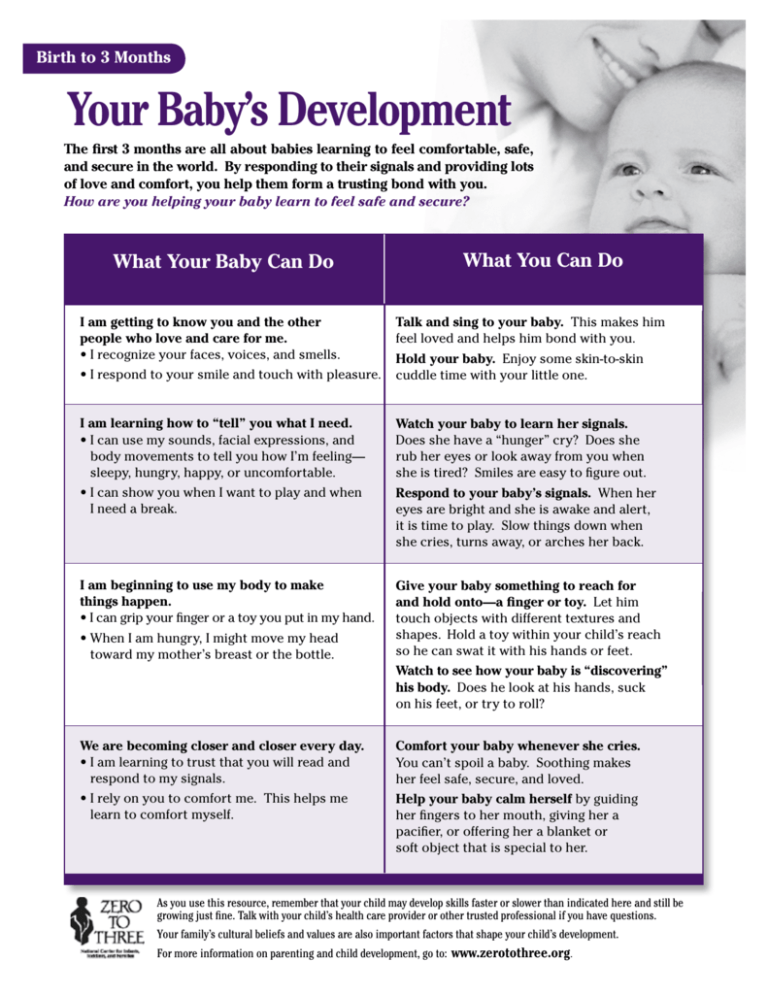
Birth to 3 Months
Your Baby’s Development
The first 3 months are all about babies learning to feel comfortable, safe,
and secure in the world. By responding to their signals and providing lots
of love and comfort, you help them form a trusting bond with you.
How are you helping your baby learn to feel safe and secure?
What Your Baby Can Do
I am getting to know you and the other
people who love and care for me.
• I recognize your faces, voices, and smells.
What You Can Do
Talk and sing to your baby. This makes him
feel loved and helps him bond with you.
• I respond to your smile and touch with pleasure.
Hold your baby. Enjoy some skin-to-skin
cuddle time with your little one.
I am learning how to “tell” you what I need.
• I can use my sounds, facial expressions, and
body movements to tell you how I’m feeling—
sleepy, hungry, happy, or uncomfortable.
Watch your baby to learn her signals.
Does she have a “hunger” cry? Does she
rub her eyes or look away from you when
she is tired? Smiles are easy to figure out.
• I can show you when I want to play and when
I need a break.
Respond to your baby’s signals. When her
eyes are bright and she is awake and alert,
it is time to play. Slow things down when
she cries, turns away, or arches her back.
I am beginning to use my body to make
things happen.
• I can grip your finger or a toy you put in my hand.
Give your baby something to reach for
and hold onto—a finger or toy. Let him
touch objects with different textures and
shapes. Hold a toy within your child’s reach
so he can swat it with his hands or feet.
• When I am hungry, I might move my head
toward my mother’s breast or the bottle.
Watch to see how your baby is “discovering”
his body. Does he look at his hands, suck
on his feet, or try to roll?
We are becoming closer and closer every day.
• I am learning to trust that you will read and
respond to my signals.
Comfort your baby whenever she cries.
You can’t spoil a baby. Soothing makes
her feel safe, secure, and loved.
• I rely on you to comfort me. This helps me
learn to comfort myself.
Help your baby calm herself by guiding
her fingers to her mouth, giving her a
pacifier, or offering her a blanket or
soft object that is special to her.
As you use this resource, remember that your child may develop skills faster or slower than indicated here and still be
growing just fine. Talk with your child’s health care provider or other trusted professional if you have questions.
Your family’s cultural beliefs and values are also important factors that shape your child’s development.
For more information on parenting and child development, go to: www.zerotothree.org.
?
Your Baby’s Development
Birth to 3 Months
What’s on Your Mind
I have to go back to work. Will my
8-week-old be okay in child care?
Yes, as long as it is a high-quality
program. Look for a clean and safe
setting with no more than three
babies for every caregiver. There
should be toys and books at the
baby’s level and child care providers who will let your baby sleep,
eat, and play according to her own
schedule. Make sure that the caregivers talk and play with the babies,
that they comfort them when they
are upset, and that they are loving
and nurturing.
Did You Know…
Babies whose mothers reported
high stress cried and fussed more
than babies whose mothers
reported little stress.1
What It Means for You:
Even very young babies pick up on
how their loved ones are feeling.
When you are calm and relaxed,
your baby is more likely to feel calm.
When you are feeling stressed out
and overwhelmed, your baby is
more likely to feel tense. So in order
to take good care of your baby, it’s
really important that you take
good care of yourself. Ask trusted
friends and family members for
help when you need a break. Make
time to do things that make you
feel good. And be sure to talk to a
trusted health care provider if you
are feeling down or depressed.
Authors: Rebecca Parlakian and
Claire Lerner, LCSW, ZERO TO THREE
Spotlight on Crying
• Crying, as hard as it is to hear, is a
normal way babies communicate
hunger, discomfort, distress, or a
need for your attention.
• Most newborns reach a crying
peak at about 6 weeks. Then their
crying starts to decrease. By
3 months they typically cry for
about an hour a day.2
• Being with a crying baby who is
hard to soothe can be exhausting,
stressful, and frustrating. But keep
in mind that just by being there—
holding and comforting your
baby—you are teaching him that
• While all babies cry, some babies
cry much more than others.
This is known as colic and it’s
defined as crying that:
3begins and ends for no obvious
reason
3lasts at least 3 hours a day
3happens at least 3 days a week
3continues for 3 weeks
to 3 months3
What You Can Do
Talk with your health care
provider. Crying may have a
medical cause—a food sensitivity, heartburn, or other physical
condition.
Try holding your baby more.
Some babies cry less when
they are held more.4 Wrap your
baby snugly in a blanket—called
“swaddling”—and rock her gently.
Use soothing sounds. Talk or sing
softly to your baby. Try running
a fan or humidifier in your baby’s
room. Sometimes babies are
soothed by this background noise.
Reduce stimulation—lights,
sights, sounds, and textures—
for your baby. Sometimes less
stimulation leads to less crying
for babies with colic.5
each out for support. Extended
R
families and friends may be able
to step in to give you a needed
This handout was made possible
by a generous grant from
www.zerotothree.org
Endorsed by:
he is not alone and that you will
stick by him through thick
and thin.
Copyright 2008 ZERO TO THREE
All rights reserved.
Printed in the United States of America.
ISBN 978-1-934019-28-3
break. Everyone needs support,
and nobody needs it more than
the parents of a crying baby.
Stay calm. When you’re calm,
it helps your baby calm down.
If you find yourself feeling frustrated, put your baby on his back
in a safe place—like the crib—and
take a short break. Crying won’t
hurt your baby, and taking a
break will let you soothe another
very important person…you!
Don’t give up. Soothing your
baby is a trial-and-error process.
If one strategy doesn’t work,
try another. Hang in there, and
remember that the crying will get
better.
What are some things you
can do to soothe yourself
after a tough day?
1 - Wurmser, H., et al., 2006.
2 - Neuspiel, D. in www.healthology.com
3 - Wessel, M., Cobb, J., & Jackson, E., et al., 1954.
4 - Monfort, G. in www.americanbaby.com
5 - Garrison, M. M., & Christakis, D. A., 2000.
Photo credit: Digital Vision/Parents and
Babies/Getty Images







